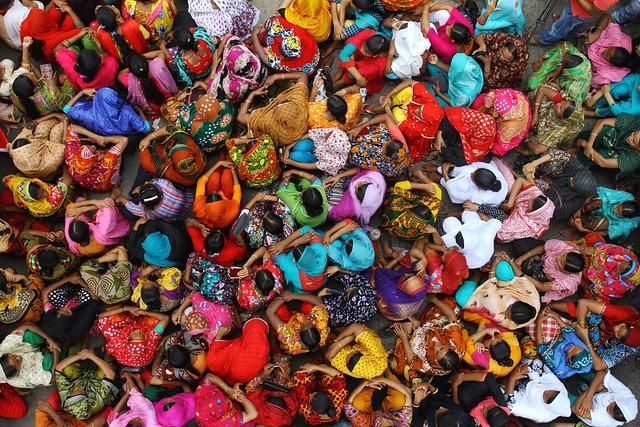In a significant development for labor rights in Bangladesh, a court has officially cleared 48,000 garment workers of criminal charges that had been pending against them for years. The ruling marks a pivotal moment for the country’s burgeoning textile industry, which is the second largest in the world. The garment sector has long been a focal point of labor disputes, with concerns over working conditions and workers’ rights frequently drawing international scrutiny. This landmark decision not only alleviates the legal burdens faced by thousands of workers but also underscores the ongoing struggles for fair treatment and dignity in the industry. As the global fashion market continues to grapple with ethical production practices, this case highlights the imperative for systemic reform and a deeper commitment to protecting those who form the backbone of one of the country’s most vital economic sectors.
Garment Workers in Bangladesh Exonerated: Implications for the Industry
The recent exoneration of 48,000 garment workers in Bangladesh marks a pivotal moment for the country’s textile industry, which is facing increasing scrutiny over labor practices. The workers, previously charged with offenses related to protests and demands for better working conditions, have now been cleared, allowing them to resume their roles without the stigma of criminality. This decision is set to reshape industry standards and strengthen the push for fair labor practices, which have long been seen as essential for sustainability in the booming garment sector.
In light of these developments, several implications emerge for brands, manufacturers, and policymakers:
- Increased Accountability: Companies may be urged to adopt more transparent labor practices to mitigate risks associated with public backlash.
- Better Working Conditions: The ruling could lead to heightened efforts to improve safety and wage standards across factories.
- Consumer Awareness: As awareness regarding worker rights grows, consumers may increasingly prefer brands that endorse fair labor practices.
| Aspect | Before Exoneration | After Exoneration |
|---|---|---|
| Public Image | Negative due to protests | Potentially improved with advocacy for rights |
| Legal Risks | High for brands | Lower, with clearer labor laws |
| Worker Morale | Low, due to fear of repercussions | Potentially higher, fostering a more motivated workforce |
Exploring the Legal and Economic Ramifications of the Case
The recent decision to clear 48,000 garment workers in Bangladesh of criminal charges marks a significant turning point in the legal landscape surrounding labor rights and workplace conditions in the country. This ruling raises important questions about the accountability of both manufacturers and government oversight in ensuring safe and humane working environments. The implications of this case could lead to major shifts in how labor laws are perceived and enforced, influencing future legislative efforts aimed at protecting workers. There is potential for greater scrutiny of the garment industry, compelling businesses to reassess their practices to mitigate legal risks and enhance worker safety.
Furthermore, the economic ramifications are substantial. The garment sector is crucial to Bangladesh’s economy, accounting for a large portion of its exports. In light of the acquittal, stakeholders may need to consider the following factors:
- Market Stability: The verdict may restore confidence among investors and international brands.
- Labor Relations: Improved relations with workers could lead to increased productivity and reduced turnover.
- Regulatory Changes: Potential for tighter regulations may increase operational costs for manufacturers.
| Sector Impact | Potential Outcomes |
|---|---|
| Legal Compliance | Enhanced adherence to labor laws |
| Global Reputation | Strengthened market position abroad |
| Worker Welfare | Better living conditions and job satisfaction |
Strategies for Strengthening Worker Rights and Preventing Future Injustices
The recent clearing of 48,000 garment workers from criminal charges in Bangladesh serves as a pivotal moment, spotlighting the urgent need for comprehensive strategies to protect and uphold worker rights in the garment industry. Advocacy groups, government bodies, and industry leaders must collaborate to create a robust framework that not only addresses current injustices but also anticipates potential breaches in the future. Key measures might include:
- Improved Labor Regulations: Enforcing stricter compliance with international labor standards.
- Worker Representation: Establishing independent unions to empower workers and give them a voice in negotiations.
- Transparency Initiatives: Requiring companies to audit and publicly disclose labor practices within their supply chains.
- Education and Training: Providing workers with knowledge of their rights and legal protections.
Moreover, the introduction of mechanisms for swift grievance redressal can play a crucial role in preventing future injustices. Creating systems where workers can report abuses anonymously and receive prompt responses would establish a sense of security in expressing concerns. A primary focus should also be on international collaboration to eliminate exploitative practices. Consider the following initiatives that could drive change:
| Initiative | Description |
|---|---|
| Global Partnerships | Form alliances with international organizations to share best practices. |
| Public Awareness Campaigns | Educate consumers about ethical sourcing and worker rights. |
| Incentive Programs | Reward companies that demonstrate a commitment to ethical labor practices. |
In Summary
In conclusion, the recent ruling that cleared 48,000 garment workers of criminal charges in Bangladesh marks a significant milestone in the struggle for labor rights and justice within the country’s apparel industry. This decision comes amid ongoing concerns about worker exploitation and inadequate safety measures in the face of international scrutiny. Advocacy groups have heralded the verdict as a vital step towards restoring dignity to a labor force that has long been vulnerable to systemic abuses. As Bangladesh continues to navigate its position in the global textile market, the implications of this ruling may pave the way for enhanced labor protections and greater accountability for employers. As the discourse around ethical fashion and worker rights evolves, the international community will undoubtedly be watching closely to see how this development influences future policies and practices within the sector.
